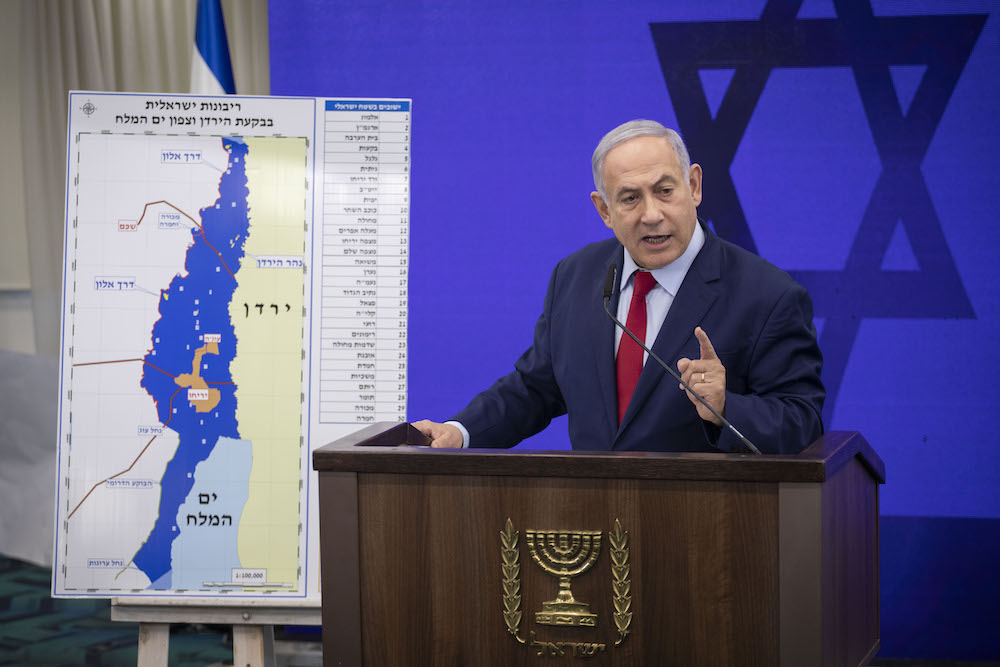It is unclear whether Israeli Prime Minister Benjamin Netanyahu will go ahead with unilaterally annexing large swaths of the occupied West Bank either on or shortly after July 1. It is also too early to tell what the practical regional and international response to annexation will be.
When it comes to sanctions, the European Union is caught in the bind of needing to secure a consensus among all 27 member states, but that won’t necessarily deter individual European countries from pursuing their own course. The UN Security Council’s hands will largely be tied by the U.S. veto, but if Democratic hopeful Joe Biden wins in November, a shift might be possible.
There are signs that Palestinian President Mahmoud Abbas means business this time, after declaring in late May that he is renouncing all agreements with Israel and the United States, including security coordination. Jordan’s King Abdullah also warned that annexation could lead to a suspension of the country’s 1994 peace treaty with Israel; but whether he acts on it will depend on the extent to which the United States will apply the screws on the one hand, and any potential unrest in the kingdom on the other.
Despite the uncertainty, there is no question that the international opposition to annexation is gaining ground. France, with the support of others such as Sweden, Luxembourg, Ireland, Spain, and Belgium, is leading a campaign to deter Israel by threatening punitive action.
As a result, Netanyahu will have to make a choice: be glorified as the prime minister who realized the right’s dream of Eretz Yisrael (the Greater Land of Israel) from the river to the sea (though with some unwanted Palestinian Bantustans in between), or go down in the annals of history as the prime minister who plunged Israel into a crisis with its Arab allies and the international community. He may decide that the risks are too great and, in his inimitable manner, find some way to spin his decision not to go forward without losing the support of his base. The big question is: what happens then?
At that point, those who threatened sanctions in response to annexation will have to make a choice as well. It will be critical that they not reward Israel by accepting the status quo. On the contrary — having shown that the international community does carry weight, and that with enough determination it can get Israel to back down, Europe should build on the momentum and, in partnership with other allies, move forward to secure an end to the occupation.
To do so, Europe must adopt a carrot-and-stick approach.
The stick is the full implementation of the policy of differentiation, anchored in UNSC Resolution 2334, which calls upon all countries to distinguish between the State of Israel and the settlements in the occupied territories in all business dealings. In line with this policy, the UN database on companies that trade with the settlements must be continuously updated, and the findings should be made public at regular intervals. The EU policy of labeling goods that originate in the settlements should be strictly enforced by all member states.
Finally, Europe should also warn that it will no longer distinguish between de facto and de jure annexation, and that it will play the sanctions card should Israel proceed with creeping annexation — such as development of the E1 area northeast of Jerusalem — which would deal a lethal blow to a viable, contiguous Palestinian state.

These moves would not only serve as a red flag for the Israeli government, but would also raise the Israeli public’s awareness of the fact that Israel will be held accountable for engaging in an illegal occupation.
And then comes the carrot. Although the Trump administration’s “Peace to Prosperity” plan is rife with references to “the State of Palestine,” the introduction makes clear that the so-called state’s sovereign powers will be limited in all areas that affect Israel’s security — meaning that the proposal is basically one of autonomy rather than statehood. Therefore, this plan, which falls far short of realizing the national aspirations of the Palestinian people, cannot serve as a basis for peace negotiations, and Europe must reject it outright.
Europe should then take the lead and convene an international conference to launch a multilateral peace process that is based on the Arab Peace Initiative, and pick up where the Ehud Olmert-Abbas negotiations left off in 2008. It must replace the paradigm of “paying but not playing” by assuming the role of active mediator rather than facilitator, and it must set out a clear timetable for the conclusion of the negotiations and the signing of a peace accord.
For over half a century, Israel has deepened its hold on the occupied Palestinian territories in defiance of endless international condemnations and multiple UN resolutions. Rather than serve as a deterrence, warnings that the occupation’s expansion is undermining the two-state solution are simply music to the ears of the Netanyahu government — thwarting any possibility of a viable Palestinian state is precisely its goal.
The international community must come to the realization that declarative diplomacy has failed, and that it must change its playbook, regardless of whether unilateral annexation goes forward.

